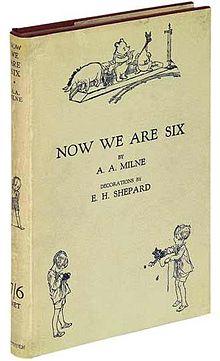 First edition (Methuen) | |
| Author | A. A. Milne |
|---|---|
| Illustrator | E. H. Shepard |
| Country | United Kingdom |
| Language | English |
| Series | Winnie-the-Pooh |
| Genre | Children's poetry |
| Publisher | Methuen & Co. Ltd. (London) |
| Media type | Print (hardback and paperback) |
| Preceded by | When We Were Very Young |
Now We Are Six is a book of thirty-five children's verses by A. A. Milne, with illustrations by E. H. Shepard. It was first published in 1927 including poems such as "King John's Christmas", "Binker" and "Pinkle Purr". Eleven of the poems in the collection are accompanied by illustrations featuring Winnie-the-Pooh. These include: "The Charcoal Burner", "Us Two", "The Engineer", "Furry Bear", "Knight-in-armour", "The Friend", "The Morning Walk", "Waiting at the Window", "Forgotten", "In the Dark" and "The End".
The cognitive psychologist George Miller has argued that the poem "In the Dark" was inspired by crib talk.[1]
Around 1930, the soprano Mimi Crawford recorded several of the poems, set to music. The 78rpm shellac record (HMV B2678) includes "Sneezles", "The Friend", "The Emperor's Rhyme" and "Furry Bear". The music is by Harold Fraser-Simson (1872–1944) who also composed the music for Toad of Toad Hall in 1929.
Now We Are Six was parodied with the (2003) book Now We Are Sixty and by an anthology of horror-themed poems titled Now We Are Sick (an anthology by Neil Gaiman). The 10th poem in the book "Us Two" was inspired A Poem Is... short.
Contents
- Solitude
- King John's Christmas
- Busy
- Sneezles
- Binker
- Cherry Stones
- The Knight Whose Armour Didn't Squeak
- Buttercup Days
- The Charcoal-Burner
- Us Two
- The Old Sailor
- The Engineer
- Journey's End
- Furry Bear
- Forgiven
- The Emperor's Rhyme
- Knight-in-Armour
- Come Out with Me
- Down by the Pond
- The Little Black Hen
- The Friend
- The Good Little Girl
- A Thought
- King Hilary and The Beggarman
- Swing Song
- Explained
- Twice Times
- The Morning Walk
- Cradle Song
- Waiting at The Window
- Pinkle Purr
- Wind on the Hill
- Forgotten
- In the Dark
- The End
See also
- When We Were Very Young, another book of poetry by A. A. Milne